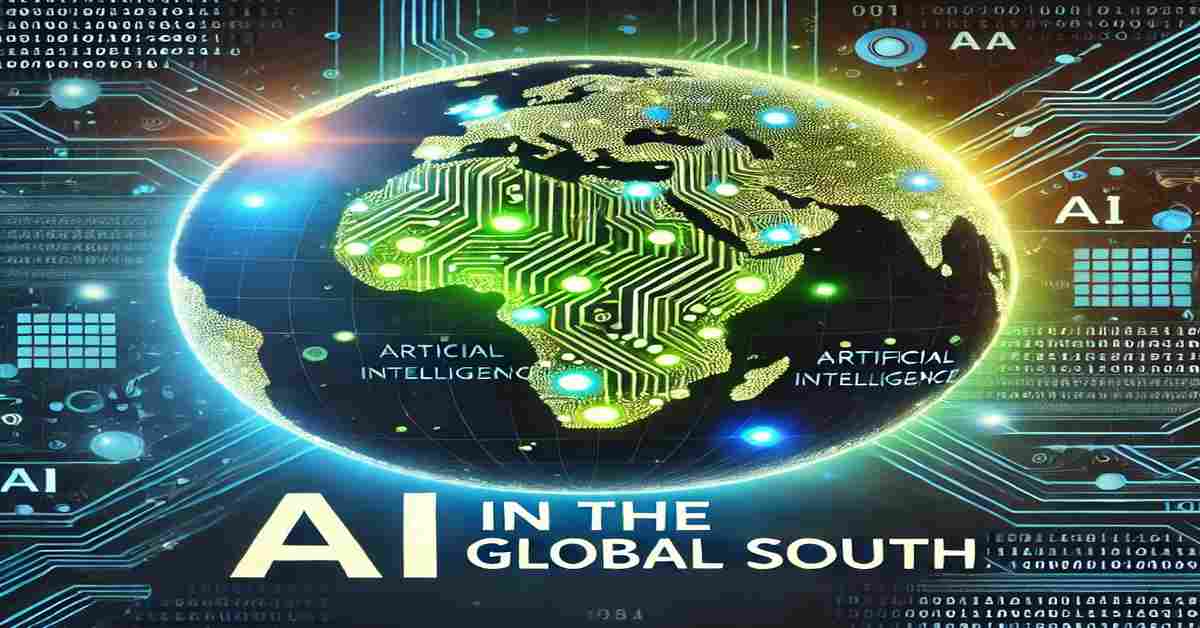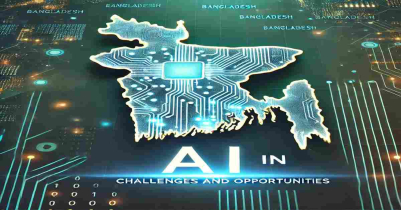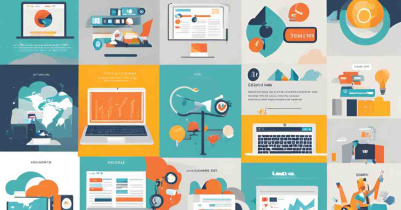Hasanat Kamal
Update: 20:00, 19 December 2024
AI in the Global South: Balancing Promise and Challenges

Artificial Intelligence in the Global South: Opportunities, Challenges, and the Path Forward
Artificial Intelligence (AI) has become a transformative force in the 21st century, reshaping industries and societies worldwide. While much of the focus on AI's growth centers on developed nations, its impact on the Global South—regions comprising Africa, Latin America, South Asia, and parts of the Middle East—deserves equal attention. These regions face unique opportunities and challenges in adopting AI technologies, presenting a nuanced perspective on the global AI revolution.
Understanding the Global South and Its AI Potential
The Global South is home to a significant portion of the world’s population, rich in cultural diversity and untapped potential. As AI technologies penetrate these regions, they hold the promise of addressing long-standing challenges in healthcare, education, agriculture, and governance. However, limited infrastructure, economic disparities, and a lack of skilled professionals create hurdles that must be overcome for AI to reach its full potential in these areas.
Opportunities of AI in the Global South
1. Improving Healthcare Access and Outcomes
AI has the potential to revolutionize healthcare systems in the Global South, where access to quality healthcare is often limited. AI-powered diagnostic tools, telemedicine platforms, and predictive analytics can help address the shortage of medical professionals and infrastructure. For example:
-
Telemedicine: AI-enabled platforms can connect rural patients with urban specialists.
-
Diagnostics: AI models can analyze medical imaging to detect diseases like cancer or tuberculosis, often outperforming human counterparts.
2. Enhancing Education
In regions where educational resources are scarce, AI can act as an equalizer:
-
Personalized Learning: AI-driven platforms can tailor educational content to individual students, improving learning outcomes.
-
Language Translation: AI tools break language barriers, making global knowledge accessible to local communities.
3. Revolutionizing Agriculture
Agriculture is a cornerstone of the Global South's economy. AI offers solutions for improving crop yields, managing resources, and predicting weather patterns:
-
Precision Agriculture: AI-powered drones and sensors help optimize water and fertilizer use.
-
Crop Monitoring: Satellite imagery and machine learning algorithms enable farmers to identify diseases early.
4. Streamlining Governance
AI can assist governments in improving efficiency, transparency, and citizen services:
-
Data-Driven Decision Making: AI helps policymakers analyze data to design better public policies.
-
Combatting Corruption: AI-powered audits can identify irregularities in government transactions.
Challenges in AI Adoption in the Global South
1. Infrastructure Gaps
AI relies heavily on robust digital infrastructure, including high-speed internet, cloud computing, and data centers. Unfortunately, many countries in the Global South lag behind in these areas, hindering widespread AI adoption.
2. Lack of Skilled Workforce
A shortage of AI researchers, developers, and data scientists in these regions limits their ability to build and deploy AI technologies locally.
3. Limited Access to Quality Data
AI thrives on data, but in many parts of the Global South, data collection systems are either non-existent or fragmented. Additionally, privacy and data security concerns further complicate the landscape.
4. Economic Disparities
High levels of poverty and economic inequality make it challenging for governments and businesses to invest in AI technologies. Moreover, the benefits of AI risk being concentrated among the elite, exacerbating existing inequalities.
5. Ethical and Cultural Concerns
AI systems often reflect the biases of their creators, leading to ethical dilemmas. In the Global South, where cultural diversity is immense, ensuring inclusivity and fairness in AI systems is particularly challenging.
Case Studies: AI in Action in the Global South
1. India: AI in Agriculture
Startups like CropIn and NITI Aayog’s AI initiative are using machine learning and IoT to provide real-time data to farmers, improving crop management and reducing losses.
2. Kenya: AI for Financial Inclusion
Kenyan fintech firms leverage AI to provide credit scoring for unbanked populations, enabling access to loans without traditional credit histories.
3. Brazil: AI in Healthcare
Brazilian health-tech companies use AI for telemedicine services, allowing patients in remote areas to access medical expertise without the need for physical visits.
Strategies for Unlocking AI’s Potential in the Global South
1. Investing in Infrastructure
Governments and private sectors must collaborate to build the digital backbone required for AI, including internet connectivity, data centers, and cloud infrastructure.
2. Fostering Local Talent
Educational institutions should introduce AI-focused curricula and partner with global organizations to train local AI professionals. Scholarships and exchange programs can further bridge the talent gap.
3. Encouraging Public-Private Partnerships (PPPs)
Partnerships between governments, tech companies, and non-profits can accelerate AI adoption while ensuring that solutions are tailored to local needs.
4. Strengthening Data Ecosystems
Establishing standardized data collection and sharing frameworks is essential for AI development. Simultaneously, robust data protection laws must be enacted to safeguard privacy.
5. Promoting Ethical AI Development
To ensure fairness and inclusivity, stakeholders must prioritize ethical AI practices, addressing biases and ensuring that diverse communities benefit from AI advancements.
The Role of Global Collaboration
International collaboration is critical for bridging the gap between developed nations and the Global South in AI adoption. Initiatives like the Global Partnership on AI (GPAI) and programs by UNESCO and the World Bank can play a pivotal role in fostering knowledge exchange and resource sharing.
Tech giants like Google, Microsoft, and IBM also have a responsibility to design affordable and accessible AI solutions for underserved regions. Additionally, involving local communities in AI development ensures that solutions address their specific challenges.
The Path Forward
While the Global South faces significant challenges in embracing AI, the potential rewards far outweigh the risks. With strategic investments, inclusive policies, and international cooperation, AI can become a powerful tool for addressing long-standing challenges and fostering sustainable development in these regions.
By ensuring that AI technologies are accessible, ethical, and inclusive, the Global South can harness the transformative power of AI, paving the way for a more equitable and prosperous future.
Read More:
- 32 megapixel camera new phone Tecno Spark 10 Pro
- Google Bard now in Bangladesh
- Samsung Galaxy A54 5G: A perfect price fit!
- Tottering from Twitter to Threads
- Elon Musk`s SpaceX hires 14-year-old Bangladeshi-American Kairan
- Refreshing only increases the speed of the computer?
- Twitter lost a huge number of subscribers
- boAt products now officially available in Bangladesh
- The Godfather of AI quits Google; warns of impending danger
- 4 websites to track Cyclone Mocha in real-time






























